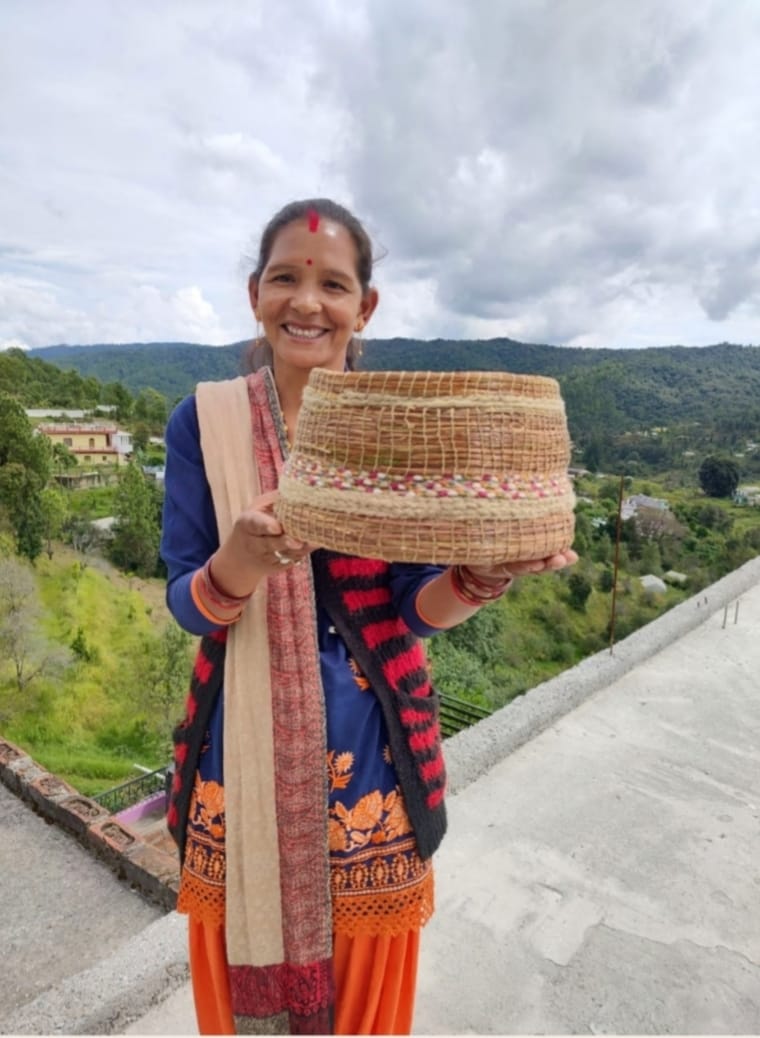
Decoding Sustainability
Nestled in the heart of Uttarakhand, Khetikhan village lives Sunita Mouni, who has found a creative outlet through Pirul Handicrafts. Surrounded by the majestic beauty of dense pine forests and rolling hills, this serene environment has inspired a community to transform what was once considered waste into stunning, eco-friendly products.
Uttarakhand, known for its rich culture and craftsmanship, has always been a region where nature and tradition are deeply intertwined. Sunita, one of the many talented women from the region, saw an opportunity in Pirul's mission to turn fallen pine needles into sustainable handicrafts.
Her journey with Pirul Handicrafts is one of personal growth, empowerment, and contributing to a sustainable future while preserving the essence of Uttarakhand’s craftsmanship. In this interview, with Sunita Ji we will explore various facets of her art and how it shapes her life.
Haati. What inspired you to start working with Pirul?
Sunita Nupur Poharkar's initiative and her vision for turning pine needles into valuable products inspired me. I had always wanted to contribute to my family’s income, and this seemed like a way to do so while staying connected to our local traditions. The idea of using something as abundant and overlooked as pine needles felt both innovative and practical.
Haati. Was there any specific incident that motivated you to join Pirul?
Sunita After the COVID-19 lockdown, Nupur came to our village in Kati Khan and introduced us to the idea of collecting pine needles and turning them into handicrafts. The idea of being able to do this work from home, with local materials that were freely available, instantly impressed me. I joined right away because it seemed like the perfect way to rebuild after the difficult lockdown period.
Haati. How popular are your products, and where do you source the material from?
Sunita Our products have gained popularity over time. While production depends on the number of orders we receive, we maintain steady work all year round. We source the pine needles from the nearby forests and turn them into beautiful handicrafts.
Haati. What aspects of traditional techniques are highlighted in your products?
Sunita Before joining Pirul, I knew some basic skills like thread tying and quilling, but most of my knowledge of handicraft construction came from Nupur herself. Combining what I already knew with the techniques she taught me has allowed me to create beautiful and functional products.
Haati. Who are the primary buyers of your products?
Sunita The majority of our sales are online, but we also participate in local fairs where customers from all over appreciate the sustainability aspect of our work.
Haati Where did you get the idea to start a sustainable and eco-friendly business?
Sunita Nupur only inspired me to join this pine needle craft sustainable and eco-friendly business which also solves the problem of forest fires.
Haati. Is the business profitable in the current times?
Sunita Yes, it has been very profitable. Before this, I didn’t have any reliable source of income, but since joining Pirul three years ago, I’ve been able to support my family and cover my own expenses. It feels good to have financial stability and do something creative at the same time.
Haati Can you tell me about your creative process?
Sunita The process starts with collecting pine needles from the forest, which are then washed and dried. Once ready, we create a variety of products like baskets, coasters, pen stands, and earrings. We use traditional techniques such as quilling and knitting, combined with what Nupur has taught us, to create unique, eco-friendly products.
Haati What challenges have you faced, and how did you overcome them?
Sunita At first, I was hesitant about collecting pine needles because some people viewed it as picking up garbage. However, once we started making beautiful products and selling them, the community’s perception shifted. The other challenge is collecting pine needles during the few months they are available, and then storing them for the whole year. We have to be very careful about storage to ensure they last through the rainy and winter seasons.
Haati What’s a common misconception people have about your craft?
Sunita There’s a common misconception that pine needles can’t be used to make sturdy products. People doubted the durability of our crafts, but once they started using them, they realized how strong and long-lasting they are. This has helped change their views.
Haati Have you had any memorable customer experiences?
Sunita Meeting Chief Minister Pushkar Dhami was a standout moment for me. He appreciated our work and took some of our products with him. It felt like a huge acknowledgment of the value of what we do.